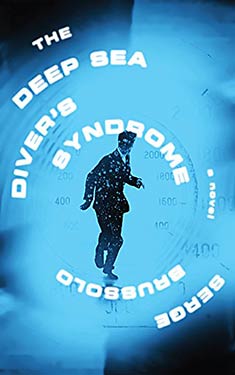Recent Releases: The Deep Sea Diver’s Syndrome by Serge Brussolo
David Sarella works with a trusted crew. His accomplice Nadia is a gorgeous redhead dressed in black leather. Jorgo may be a bit simple-headed, but he is an excellent driver. They plan to break into an upscale jewelry store in an exclusive shopping district and empty the safe. Their immediate problem is that the sleek, black automobile they have chosen for this escapade is transforming into a shark. The metal frame has become slimy and the fish smell is unbearable. These are “stability issues,” and Nadia’s job is to monitor David, to see that he takes the proper maintenance drugs. The team is operating at a depth of 3300 feet, but they are already rising. David must complete the theft before he is forced to surface.
David is a master thief but a professional dreamer. In Serge Brussolo’s near-future Paris, mediums like David enter their dream worlds, perpetrate their crimes, and bring back their takes to the waking world. David’s dreams are informed by the pulp fiction he’s read since childhood, and the dreaming process is, as for most mediums, experienced as a plunge into ocean depths. He absconds with jewels that on the surface manifest themselves as mounds of ectoplasm, that white sticky stuff nineteenth century mediums supposedly exuded from their mouths, noses, and other orifices during séances.
But David and his fellow dreamers are not fakes. Their ectoplasmic creations, delicate a newborns, get whisked away for quarantine and testing. Once they are stable they go onto the art market, a market they have destroyed and transformed. Museums have sold off their collections of old art to junk dealers and replaced paintings and sculptures with ectolplasmic abstractions, the most accomplished of which sell in auction for millions. Our hero is not in that league. He makes a living as a minor artist whose works end up in museum gift shops. He’s more or less made his peace with that, but he is facing a crisis. Recently he’s come up empty handed after his dives, and some of what he has brought back is too feeble to make it past quarantine. His is the uncertain future of a failed artist.
Readers are left wondering for the first half of the story just what is the deal with this new art form? The descriptions of the objects are vague and not particularly appealing, but we learn that these creations make people feel good. They can make them feel really good. Even David’s tchotchkes lighten the spirits of those who collect them. A major work, like the monumental creations of Soler Mahus, can transform lives. David goes to revisit Soler’s magnum opus in its permanent public installation.
The great dream that had stopped the war had sat enthroned on Bliss Plaza for five years…It’s presence had driven up the apartment prices in the neighborhood, everyone wanting to live close to the work to benefit from its soothing emanations…residents in buildings overlooking Bliss Plaze were totally free of psychosomatic complaints. Better still: incurable diseases had completely vanished in a three hundred yard radius of the oneiric object. The lucky few lived with their windows open, naked most of the time…Those without the means to rent apartments nearby made pilgrimages to Bliss Plaza…a silent, naked crowd sprawled on the steps and grass.
As a practicing dreamer, David also knows the downside of ectoplasmic art. The objects have a shorter shelf life that of the old art. When they begin to decompose they not only stink, they become sticky and toxic. Art disposal is a growth industry, but there is a “finger in the dike” element to its struggle against a growing mountain of fetid art. And then there are the health problems faced by its creators. All that ectoplasm can never be fully expelled, and build up over time causes esophageal and pulmonary issues.
On one level, Brussolo’s novel is a satire on the distinctly Parisian vision of the starving artist in his garret, the failed genius in feverish pursuit of a vision that remains beyond his grasp. Despite his lessening powers and declining health, David cannot forsake his dream world, which is admittedly more vivid than the drab life he lives between dives. He will be willing to risk all for a final plunge to a greater depth than any dreamer has either ever attempted or lived to tell about.
The publishers describe The Deep Sea Diver’s Syndrome as a “visionary neo noir thriller.” There is a trace of marketing legerdemain here. David may be a trapped man in a system that once supported him and that now has little use for him, but Brussolo doesn’t employ the mounting tensions of David’s predicament to build suspense or a sense of panic. He creates an inventive progression of scenes that illustrate aspects of this bizarre world. The novel might better be described as “entertaining and very cerebral science fiction,” which admittedly doesn’t have the ring of ”visionary neo noir thriller.”
The good news for readers who find they like Brussolo’s technique and vision is that in France he has published somewhere in the neighborhood of 200 novels. The bad news is that this is his only work to have made its way into English, and there are no plans in place for future translations.
WWEnd Presents: An LGBTQ Speculative Fiction Resource
 Here at Worlds Without End we love lists. Lists of great books that cover the many different aspects of genre fiction. And from time to time we’ll add a new one to our ever growing list of lists that we get particularly excited about and this is one of those. An LGBTQ Speculative Fiction Resource is our curated list of the best in lesbian, gay, bisexual, transgender, and queer speculative fiction.
Here at Worlds Without End we love lists. Lists of great books that cover the many different aspects of genre fiction. And from time to time we’ll add a new one to our ever growing list of lists that we get particularly excited about and this is one of those. An LGBTQ Speculative Fiction Resource is our curated list of the best in lesbian, gay, bisexual, transgender, and queer speculative fiction.
This list was a project started by Uber User Stephen Poltz (spoltz) in reaction to our 2015 LGBT Reading Challenge when he could not find a good source for challenge books to read. Steve cherry-picked the Lambda and Gaylactic Spectrum awards along with many other resources online and combined those books with some of our own member selections to create a list that we hope you’ll agree is a great resource that highlights the works of an under-served part of our genre community.
The list is 178 books so far and we’ll be adding to it as time goes on. Check it out and let us know what you think. Don’t forget to check out the reading challenge too. The 2015 edition is winding down with the year but will be back again in January with a new challenge.
Solar Express – Three Views
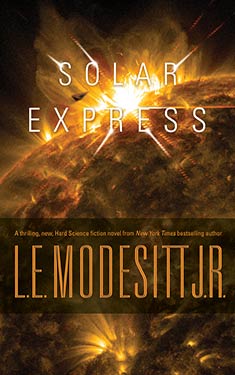 A Futurist, a UFO researcher and a SF guy all walk into a bar carrying read copies of Solar Express. They sit down and get their drinks.
A Futurist, a UFO researcher and a SF guy all walk into a bar carrying read copies of Solar Express. They sit down and get their drinks.
SF: Well, what do you think?
They look at each other. No one says a thing for a few moments.
SF: That bad?
F: Well… I’m trying to think of something nice to say.
UFO: Don’t bother.
F: The man knows hard science but he knows jack about Futures.
SF: Is he supposed to? Would it help the story?
F: It would be nice if a major SF author knew a little bit of Future Studies. Just the basics, mind. I don’t think that’s to much to ask. But this, hell, this is the worse kind of SF. The stuff I can’t stand.
UFO: Here, here.
F: He simply runs a few of today’s trends out, establishes his baseline and then that’s it. A few trends do not a future make. What about all the other trends and how they interact with the trends he’s using? Nothing. Besides, it’s never the baseline.
SF: Is that a Futures’ secret?
F: No it isn’t. It’s what they teach first day. When you run today’s trends out, you get the baseline, but the answer you’re looking for is never the baseline. I’d be shocked if it was.
SF: So you don’t like his world construction.
UFO: Pathetic.
F: Exactly. There’s no change. His politicians are jackasses, the politics are so brazenly normal it’s shocking. Post-docs as wage slaves, on the back side of the moon. (Disgust noise.) At least the background glimpses of the society we got in Clarke’s Rama were different.
SF: That’s hardly being fair.
UFO: That’s life.
F: Let’s just say you were reading something from a hundred years ago or so, something Victorian. And they made a big deal about a woman not being a virgin….
SF: Isn’t that a plot point in Tess… something…
UFO: D’Urbervilles. Yeah, it was.
F: Fast forward a hundred years or so to us, and that doesn’t mean a thing. Victorian lit’ is quaint. Human, certainly, but quaint, and concerned with things we don’t care about. And we’re supposed to believe that there’s been no changes like that in the hundred years out to the time of the novel? I think it makes for very uneven reading.
SF: But that really wasn’t the point.
F: Point or not, the fact it’s not there, not even really considered, is important. The society in which this novel is set, is an important point, but he is either not interested in talking about it or does not have the talent to talk about it. What we get is a blasé “they’re just like us” and he moves on to com’ chatter between a shuttle and station control.
SF: That did get a little repetitive, didn’t it? That and the intricacies of station repair. Life and science in space can be quit tedious. So… what else?
UFO: From my perspective, the whole thing was based on a faulty premise. They’re here. The best minds in the field think they’ve always been here. And it’s only Human arrogance, stupidity and lies that we believe otherwise.
F: Now who’s being harsh?
UFO: He’s in a cul-de-sac. Especially a technological one. The way he talks about space travel is quaint.
SF: Quaint?
F: His expression of space travel is a projection forward from the Now, but if the Now is based on a lie or faulty data, then the projection forward is useless. It can’t be a useful baseline if it’s based on faulty data. It’s gibberish.
SF: What’s the lie you mentioned?
UFO: We’ve known since the 50’s that you can go into a lab and break all three of the so-called Newtonian laws. Period. This mean they’re not laws of any sort just approximations of reality under certain conditions. Change those conditions enough and these so called laws stop working.
SF: Ouch.
UFO: Since the government has know that for close to 70 years, space travel as we know it from NASA is a dog ‘n pony show for the rubes. The lie is, that’s the way it has to be.
SF: And we’re the rubes.
UFO: Exactly. The lie covers the existence of what can be called the technology of the gods. We barely survived the nuclear era with that level of technology. Do you really think we could survive “the death star has cleared the planet” levels of technology?
F: The lie is a good thing then?
UFO: Hell no.
SF: So, we’ve got faulty premises and a background society that’s just like us…
F: And M.A.D. too.
SF: Mutual Assured Destruction. Tediousness at times. What else? I’ll add that there were passages that I got bogged down in with all the science and techno babble.
UFO: I thought the arc of the story itself was really obvious. I kept waiting for something to pop up that wasn’t what I expected. I wasn’t expecting monsters or any dribble like that but… you know… observation, mission, solve some problems, get back safely, win the girl and a medal. No surprises.
F: I thought the relationship between those two was… quaint. Almost like something out of the 19th century. They wrote long letters of encouragement to each other. How nice and romantic. That just strikes me as unrealistic. We’re a hundred years out. Moore’s law for computation power seems to have stalled or slowed precipitously. Hell, IBM’s Watson is practically on the level of the COFAR M.I. today. And everyone seemed to have skimped on bandwidth for reasons which seemed either lame or nonexistent.
SF: We’re back to world construction from the trends.
UFO: And those Hotnews! summaries. They reminded me of Ruby Rhod from The Fifth Element.
F: Yeah. Him. If that’s where Humanity gets it’s news, no wonder that society was M.A.D.
SF: That’s scarcely a criticism since the same can be said of our own.
F: I actually thought that stuff was quite tame. Compared to what one might get if you ran today’s crap that passes for news forward by a century.
SF: I liked the quotes.
F: But they’re so applicable to our own society as well.
UFO: That can’t be much of a criticism since one can read the political musing of Cicero and they’re equally valid.
SF: Do we know if he made those quotes up, like Herbert did all the time, or did he get them from somewhere? I assumed he did the Herbert thing. It’s a writing technique I’ve always liked.
F: No idea.
UFO: I assumed it was the author speaking to us through the quotes.
The conversation stalls for a moment as another round of drinks is brought over.
SF: I think we’re being a bit harsh. Isn’t there anything to like in this book?
F: That, I think, is the real problem. It’s solid work, if you just read it and that’s it.
SF: In the moment, it’s fine. But once you start picking at what he’s doing and why, it comes apart.
UFO: You’d have to discount fundamental scientific advancement being in a cul-de-sac since Einstein.
F: And discount the inconsistent use of the trends in your world building…
SF: Nothing memorable about the characters either…
UFO and F glance at each other, knowingly.
F: You’re not going to bring Gally into this are you?
SF: I was not. That’s really not fair. But a fairer comparison would be there’s no Paul Maud’Dib, no Sylia Stingray, no Hal 9000, no Major Motoko Kusanagi, no Deckard. There’s no one here I’m going to remember beyond next Tuesday. No one unforgettable.
F: What’s the name of the captain who leads the team onto the ship in Clarke’s original Rama book? Don’t…
F points at UFO who was about to answer.
SF: I don’t remember.
F: What’s the plot for that book?
SF: Space ship comes cruising in to use the Sun for a gravitational turn. An Earth ship can intercept, so it does, dead silence and alien stuff. Happy endings for first contact; no fatalities. Ship leaves them in the stellar dust.
UFO: The humans in that story seemed saner? more intelligent? less fracked up? than this story.
F: Less petty. But the point was, you don’t remember the fine details of Rama, so you won’t remember the fine details of this either. But a one sentence summery in 20 years? Probably. Like I said, it’s solid work, if you don’t think about it.
UFO: Safe too.
F: Very safe. It’s works on the assumption that we’re just going to teeter along, creating and solving our problems, just getting by, muddling through like we’ve always done. That is a highly dubious assumption.
UFO: And there’s that bullheaded drum beat about how far away other civilizations are, and not going faster than light speed, and why would aliens bother with this backwater. Hideously stupid.
F: Those three things are all assumptions.
SF: And if all three are wrong…can one write great SF?
F: I don’t think so. You can write solid and safe but not great.
SF: Because greatness usually breaks molds, upsets apple carts, and goes places never gone before.
UFO: Can’t accuse this book of that. (Laughs.)
They grow quiet for a moment, finishing the current round of drinks.
SF: We’ve not even skirted around the big lie which sets the book in motion.
UFO: You cannot militarize space. Bull.
SF: The minute I read that statement, which was right after the back cover of the book, I thought we were already in trouble. Another quaint idea.
F: Another assumption about how the world works which, unfortunately, isn’t true.
SF: We’re all adults here. We know N.A.S.A. was incorporated under the D.O.D. which mean anything they do…
UFO: Or find…
SF: …can be classified under national security concerns. That’s how it always starts.
UFO: The Snowdons of the world aside…
F: The exceptions which prove the rule…
UFO: …you can keep secrets. And there are many many secrets in this country.
SF: It seems to me you can militarize space all you want, you just can’t tell anyone, publicly acknowledge that you’re doing it.
UFO: Plausible deniability. Exactly. You need secrets being kept, black projects up and running, with compartmentalization of those projects.
F: Oh my, none of that around here.
UFO: And boatloads of money.
SF: How many times has a D.O.D. head made the trek up the hill in the last 30 years and said…(In a passable Goofy voice) Garsh, hyuk, we seem to have misplaced several trillion dollars. Hyuk.
UFO: More than once.
F: If we have secret space stations…
UFO: Or bases on the moon…
F: Who’s going to know it in the civilian population…? And spill the beans…? And be believed…?
SF: Still, it’s a nice idea.
UFO: I’m too old for nice ideas. Democracy is a nice idea too.
SF: Let’s definitely not go there. That certainly wasn’t part of the novel. I’m really bothered by a feeling that for all our harping, I think you’re right. It’s a solid novel.
F: Except for…
SF: Except for everything which we don’t like about it. I finished. Does that count?
UFO: Do you want a reward? Milk and cookies, perhaps?
F: I see no contradiction in the idea that a solid work can also be complete B.S. Yes, it is forgettable, isn’t it?
SF: Only a handful of books published each year, or maybe each decade, have any staying power at all as the generations pass.
UFO: This isn’t one of them.
SF: So, are we agreed? Solid, Safe and Forgettable.
After a pause, they all nod. They get up to leave.
SF: I’m off to sell my copy.
F: I’m just going to donate mine to the YWCA’s used book sale.
UFO: I have a plant stand that needs a support under one leg….
SF: I thought you’d give it to one of your friends upstairs.
UFO: That’s were I got mine originally. Some of them read a lot.
They all laugh before dispersing into the night…
NEW RELEASES: The Man Who Spoke Snakish by Andrus Kivirahk
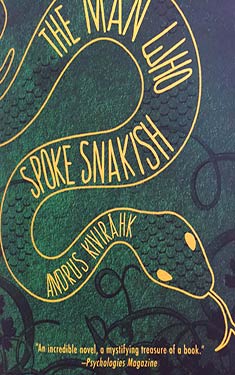 Leemet is a young man of the forest people. When he was a child, too young to remember the experience, his parents had made the move to the village. His father learned to work the fields and even developed a taste for bread, but Leemet’s mother became bored and could not adjust to village life. This made her easy pickings for a bear, those lotharios notorious for stealing away human wives. When Leemet’s father caught his wife and her lover in flagrante delicto, the startled animal bit his head off. Leemet’s mother, subsequently abandoned by the bear, returned to the forest with her infant son.
Leemet is a young man of the forest people. When he was a child, too young to remember the experience, his parents had made the move to the village. His father learned to work the fields and even developed a taste for bread, but Leemet’s mother became bored and could not adjust to village life. This made her easy pickings for a bear, those lotharios notorious for stealing away human wives. When Leemet’s father caught his wife and her lover in flagrante delicto, the startled animal bit his head off. Leemet’s mother, subsequently abandoned by the bear, returned to the forest with her infant son.
For Leemet this has been a good thing. His life in the forest is fun and adventurous. His uncle is one of the last fluent speakers of Snakish, the language that allows humans to communicate with snakes, those wisest of forest inhabitants, and exercise control over other animals. Without Snakish, it is difficult to maintain an adequate herd of wolves, and wolves are needed for both transportation and their milk. Leemet masters the ancient language, and he spends his days with human friends his own age, his older male relatives, and the invaluable snakes who offer both advice and the warmth of their burrows in the winter. He is also friendly with the primates, an older hominid species who has not left the trees and spend most of the time breeding wood lice the size of sheep.
Andrus Kivirahk is the most popular contemporary author in Estonia, known as a satirical journalist and a bestselling novelist. This novel, which appears to take place in a fantastic version of his homeland during the early middle ages, is his first to be translated into English. It is an engaging tale of old ways giving way to modernity, filled with episodes of comic invention, family drama, young love, and the sadness of old traditions giving way to a modernity that offers much but exacts a stiff toll.
Leemet is the perfect hero for such a tale, a tenth-century, Estonian Huckleberry Finn. Despite his snakish wisdom, he can be very naïve. He perceives the armored knights that come from across the sea on their armored horses as single, metallic creatures. He is surprised to discover how relatively easy they are to kill. The obese, berobed monks who accompany them he assumes are their ever-pregnant wives.
Leemet may be naïve, but he is not stupid like those who have abandoned the forest for the village. Village dwellers, vehement about their newly acquired civilized skills and Christianity, believe all sorts of superstitious nonsense about the forest and its supposedly demonic denizens. And they rejoice in their subservience to their German-speaking masters. The village leader was taken as a young man across the sea for training in civilization and the new religion. When he speaks with pride of his time spent as the bedmate to an archbishop, Leemet cannot help but feel that there is something off about this arrangement.
But Kivirahk’s novel will be the story of sad, funny, and inevitable change. As I read it, I wondered what added resonance it had for its Estonian audience, who have taken it so to heart that a popular board game has been created around it. For English readers it is a thoroughly enjoyable historical fantasy and an introduction to a major European writer.
(I received an advanced ebook of this title from Net Galley.)
NEW RELEASES: The Night Clock by Paul Meloy
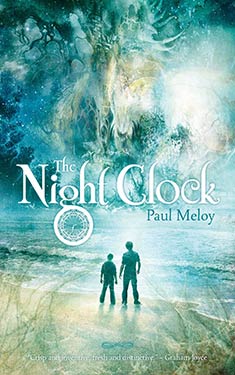 I had this as an advanced reader’s copy through Net Galley, and I went into it knowing nothing of the author or the plot. I don’t know, however, that much prior information would have helped me with the first couple of chapters. Meloy dumps us into a netherworld where the planet Mars takes the place of the moon, and characters I sensed were the good guys kept to their side of the street while a pub across the way served as a passageway for very bad things to enter their world. The next chapter involved a farm house bothered by a zombiefied relative who ate hot stew with his bare hands, had to be led away on the tines of a pitchfork, and set on fire in a field.
I had this as an advanced reader’s copy through Net Galley, and I went into it knowing nothing of the author or the plot. I don’t know, however, that much prior information would have helped me with the first couple of chapters. Meloy dumps us into a netherworld where the planet Mars takes the place of the moon, and characters I sensed were the good guys kept to their side of the street while a pub across the way served as a passageway for very bad things to enter their world. The next chapter involved a farm house bothered by a zombiefied relative who ate hot stew with his bare hands, had to be led away on the tines of a pitchfork, and set on fire in a field.
It took me several pages into the next sequence to realize that Meloy was settling down to his plot. A housing estate somewhere in the UK, with its boarded up shops, council flats, graffiti-covered walls, and threats of violence suggested a dystopian, post-apocalyptic setting, but no, this is just a miserable place to live. Meloy can really pack in the information. With the background of a mass shooting at a day care center, he introduces us to a feckless estate patrolman, an alcoholic hanging onto some sense of dignity, and a social worker whose cases have begun to either kill themselves or others. And there are monsters, hideous creatures that can possess the weak and pursue those who might be a threat to them.
Meloy has worked as a psychiatric nurse, and this section grounded in the world of the housing estate, with his hero Phil Travena dealing with suicidal and homicidal clients, a weaselly new boss brought in to “tighten the ship,” drunks and a growing sense that these monsters may not be hallucinations sets the action in both a very real and very creepy world. Once we are part of the pitched battle between good and evil, things take on the more predictable cast that such battles usually entail. But Meloy continues to create inventive situations, engaging characters, and grand set pieces. His monsters are spectacular creations that wear their debt to Lovecraft lightly. The talking animals are a problem, but that could be my inherent resistance to talking animals.
Much of the plot involves the impending birth of Chloe, a child whose existence is crucial to victory over the dark forces. In one of Meloy’s most successful narrative devices, we get to know Chloe as an adult character, stranded in a dangerous world as she waits to be born. There are also a man and his son who start as characters in a children’s book who become major players in the battle.
At times I felt that Meloy’s story needed a larger canvas than he provides, but when I weighed that against his ability to wrap things up as quickly as he did, I decided he made the right choice. He ties things up well. That illogical zombie scene from the first pages even makes sense by the time the story is over. And although he doesn’t end with cliffhangers, Meloy could easily return to this world for further novels.
New Book Lists for a New Year: The Defining SF Books of the 50s, 60s, 70s, 80s and 90s
So a few weeks ago we added 5 great new book lists to WWEnd and we’re finally getting around to telling you about them. The Defining SF Books of the 50s, 60s, 70s, 80s and 90s are lists by James Wallace Harris a friend of WWEnd and the creator of The Classics of Science Fiction list which is one of our most popular lists. No stranger to lists is he.
We found these lists some time ago on Jim’s Auxiliary Memory blog and we’ve been working with him the last few months to get all the books added to our site and build out the lists. (A special thanks to our Uber Users for the data entry!) Jim wrote up some great short intros to each of the lists and we’ve included links over to his blog so you can read the original articles where he explains his reasons and methodology for picking these books.
Each of these lists is representative of the best remembered books from the decade and each is divided into 2 sections. The first section is a selection of 12 books that might/could/should be remembered and read into the 22nd century. These are taken from the list proper and are the books that have influenced the genre for years. These are books with real staying power. You’ll recognize most of them as widely acknowledged genre classics and many of them come from the SF Masterworks series.
The second part of each list are books grouped by year published. These vary in length from year to year. Some years, like 1968, are particularly strong and have as many as 26 books while others, like 1978, fall a little short and have as few as 3 books total. As usual, if you’re a WWEnd member you can see at a glance just how many from each decade you’ve read and of course a lot of these are new to the site so you may find some books that you’ll need to tag as read or add to your reading list.
If you’re looking to read a sampling from each decade you can simply focus on the top 12 books from each list. Those 60 books alone are a good cross section of what the genre had to offer for those fifty years. If you want to read deeper into a specific decade these lists are a great place to find recommendations. In fact, one WWEnder has just started a Roll-Your-Own Reading Challenge based on the 50s list. Check out The Definitive 1950s SF Reading Challenge if you’re ready to dive into the first list. And, by the way, there are currently 31 other challenges to chose from too so you’re sure to find something to strike your fancy for 2015.
A huge thank you to Jim Harris for creating the lists and for his help in implementing them on WWEnd. We think you’re really going to like these new lists. Read on!
Genre Lit-Flicks Additions
Due to popular demand, we have added a number of new books that have been adapted to film to our Genre Lit-Flicks list! See the full list below, complete with Instant Video links:
 |
Babylon Babies, by Maurice G. Dantec
Adaptations: |
 |
Battlefield Earth, by L. Ron Hubbard (hey, you asked for it)
Adaptations: |
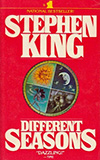 |
Different Seasons, by Stephen King
Adaptations of Collected Novellas: |
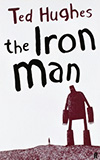 |
The Iron Man, by Ted Hughes
Adaptations: |
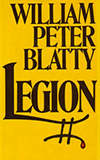 |
Legion, by William Peter Blatty
Adaptations: |
 |
Planet of the Apes, by Pierre Boulle
Adaptations: |
 |
Red Dragon, by Thomas Harris
Adaptations: |
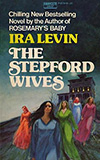 |
The Stepford Wives, by Ira Levin
Adaptations: |
 |
A Stir of Echoes, by Richard Matheson
Adaptations: |
 |
We Can Remember It for You Wholesale, by Philip K. Dick
Adaptations: |
Do you know of more adapted books you want added to our list? Tell us in the comments!
New Film(!) List: Genre Lit-Flicks
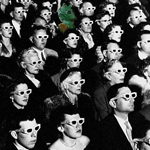 Anyone paying close attention to our novel pages today may have noticed a curious thing. Many of our novels now have a section for “Film & Television Adaptations.” This was added to tie into our brand new shiny book list, Genre Lit-Flicks. This begins our project to build what we hope will be the definitive list of Science Fiction, Fantasy, and Horror novels adapted for feature films and television. Here are some fun facts to whet your appetite:
Anyone paying close attention to our novel pages today may have noticed a curious thing. Many of our novels now have a section for “Film & Television Adaptations.” This was added to tie into our brand new shiny book list, Genre Lit-Flicks. This begins our project to build what we hope will be the definitive list of Science Fiction, Fantasy, and Horror novels adapted for feature films and television. Here are some fun facts to whet your appetite:
Did you know…
…the children’s classic The Lion, the Witch and the Wardrobe has been adapted a total of three times: once animated, once as live-action for the BBC, and most recently as a special effects extravaganza by Disney?
…John Carpenter’s horror film The Thing (1982) was adapted from the novel Who Goes There?, which also spawned the film The Thing from Another World (1951) and the prequel The Thing (2011)?
…legendary actor Marlon Brando’s most infamous role was in the critically panned The Island of Dr. Moreau (1996)?
…the novel The Body Snatchers was adapted four times as Invasion of the Body Snatchers (1956), Invasion of the Body Snatchers (1978), Body Snatchers (1994), and The Invasion (2007)?
…auteur director Andrei Tarkovsky’s film Stalker was an adaptation of the SF Masterworks novel Roadside Picnic?
…the ur-Horror novel Dracula has been adapted to film so many times we didn’t even try to list them all?
These and many other fun facts await your perusal at the Genre Lit-Flicks list.
But wait… there’s more!
That’s right! In addition to providing our loyal WWEnd members with the most comprehensive and up-to-date list of genre novel adaptations, we are launching a new blog series entitled Hell is Adaptations (series is not yet rated), which will document our ongoing trudge through the mire of Hollywood’s idea of what makes for good genre storytelling.
See any glaring omissions in our list? Think we should add a book to our database that was made into your favorite movie? Let us know in the comments below! Just be aware that we are not planning to add adaptations to the list until they have a theatrical or (shudder) direct-to-DVD release. We do know that World War Z is on its way, thanks…
Nightmare Magazine’s Top 100 Horror Books

One of the things we really wanted to do for Month of Horrors was expand our selection of Horror novels on the site. Last year we added the Bram Stoker Award and the Horror Writers Association Reading List, and at the top of this month we added the Shirley Jackson Award. All great additions, of course, but we found ourselves wanting more. Our Horror selection is still dwarfed by Science Fiction and Fantasy, so we thought it would be great to add a new Horror-based reading list. Unfortunately, none of us running the show at WWEnd are experts in Horror, so any list we could have created would be a wild guess at best, or a hilarious mess at worst.
 So we decided to consult the experts at Nightmare Magazine, instead.
So we decided to consult the experts at Nightmare Magazine, instead.
What we got back was a list of Nightmare Magazine’s Top 100 Horror Books, spanning everything from late gothic to splatterpunk, from killer clowns to devil babies, from vampire romance to vampire apocalypse. It’s like a synecdoche of the entire genre through it’s entire history, and we like to think it has a little something for everyone. Our thanks to Nightmare publishers John Joseph Adams and R. J. Sevin especially for creating this great list!
(Please note that many of the anthologies are included in the list in their entirety, not just as their first volumes. We will be adding the rest of the volumes to the WWEnd database over the next few days.)
Peruse the new list to see if there’s anything you want to add to your reading list. Remember, your Horror reviews posted on WWEnd throughout October will be considered for publication in the blog for the Month of Horrors.
Hello World!
 Welcome to our first WordPress driven blog post!
Welcome to our first WordPress driven blog post!
Normally, when we announce new updates to the site, it’s something (we think is) exciting and new, like a new interactive book-tracked list, a cool reading contest, a nifty way to rank authors, or (my favorite) BookTrackr.
This time, however, we have announcement that is both exciting and mundane. Yes. That’s right. Worlds Without End has finally ditched its 1990s-style blogging/commenting engine (you know, the one that made you type twisted captcha words and blew up if you used the wrong keys from, you know, your keyboard) in favor of WordPress. Yes. We know. WordPress has been around probably longer than WWEnd has.
So…no. This news isn’t exactly cutting edge. It does, however, mean that our blog will act like every other blog you know, which means we can clip some of those dissertation length posts, and the interface won’t have those eccentricities that get in your way. So, huzzah!
BTW, relatively invisible changes (like this WordPress transition) are much much harder to do than the whiz-bang interactive stuff that people like so much. I know it seems like BookTrackr would be harder to make (from scratch) than integrating a plug in blog, but Chris (our hard working tech guru, a.k.a. Whargoul) begs to differ. So, thanks to Chris, Jonathan and Dave for ensuring that I never have to edit apostrophes out of my comments (or guess at captcha words) again!
Do bear with us as any new site feature, such as this, will require a learning curve on our part. We will be tweaking it over the coming weeks.
UPDATE: If you’re having any difficulties with your RSS feed reader, here is the link to the new feed: http://blog.worldswithoutend.com/feed/



















 Full Details
Full Details
